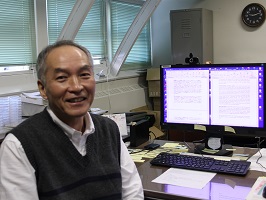Asao Noda
Affiliation
Department of Molecular Biosciences
E-mail: asnoda@rerf.or.jp
E-mail: asnoda@rerf.or.jp
About
Since 2018, Dr. Noda has been working as the chief of the Department of Molecular Biosciences, which was established by the merger of the former Departments of Radiobiology/Molecular Epidemiology and Genetics in 2016. Those two departments had a long history of supporting the basic biology of radiation effects observed in RERF studies. He has been working on the mechanisms of DNA repair, mutagenesis, as well as on studies of cancer-prone diseases associated with defects of DNA repair. He had also studied the Hayflick model of cellular aging at Baylor College of Medicine. Recently, he developed a recombinant mouse model for detecting in vivo-arising mutant cells in a spatiotemporal manner. The Department of Molecular Biosciences is now focusing on studies of radiation genomics and omics with the use of biospecimens from atomic bomb survivors and their children.
Education
- 1989
- Ph.D. Kyoto University (Radiation Biology)
- 1984
- Kyoto University graduate school of science (Zoology)
- 1979
- Shizuoka University (Biology)
Experience
- Radiation Effects Research Foundation
-
- 2018-
Chief, Department of Molecular Biosciences
- 2016-2018
Associate Chief, Department of Molecular Biosciences
- 2011-2016
Associate Chief, Department of Genetics
- 2005-2011
Lab Chief of Cytogenetics
- 2002-2005
Research Scientist
- 2018-
- Kobe University
-
- 1997-2002
Lecturer, School of Medicine (Radiation Biophysics and Genetics)
- 1997-2002
- Meiji Cell Technology Center
-
- 1991-1997
Lab Chief of Cell Regulation
- 1991-1997
- Baylor College of Medicine
-
- 1989-1991
Research Associate, Department of Molecular Virology and Epidemiology
- 1989-1991
Selected publications
- Noda A., Kato K, Tamura C, Biesecker L.G., Imaizumi M, Inoue Y, Henderson G,E., Wilfond B, Muto K, Naito M, and Kayukawa J. Ethical, legal, and social implications of human genome studies in radiation research: A workshop report for studies on atomic bomb survivors at Radiation Effects Research Foundation. J. Radiat Res. 2021; 62(4): 656-661. https://doi.org/10.1093/jrr/rrab043
- Noda A.. Radiation-induced unrepairable DSBs: Their role in the late effects of radiation and possible applications to biodosimetry. J. Radiat Res. 2018; 59:S2: 114-120. https://doi.org/10.1093/jrr/rrx074
- Noda A., Mishima S, Hirai Y, Hamasaki K, Landes R.D, Mitani H, Haga K, Kiyono T, Nakamura N, Kodama Y. Progerin, the protein responsible for the Hutchinson-Gilford Progeria Syndrome, increases the unrepaired DNA damages following exposure to ionizing radiation. Genes and Environment. 2015; 37:13. https://doi: 10.1186/s41021-015-0018-4.
- Noda, A., Suemori H., Hirai, Y., Hamasaki, K., Kodama, Y., Mitani, H., Landes, R.D., Nakamura, N. Creation of mice bearing a partial duplication of HPRT gene marked with a GFP gene and detection of revertant cells in situ as GFP-positive somatic cells. PlosOne. 2015; 0136041. DOI:10(8):e0136041.doi:10.1371/journal.pone.
- Nakamura, N., Suyama, A., Noda, A., Kodama, Y. Radiation effects on human heredity. Annual Review of Genetics. 2013; 47:33-50.
- Noda A., Oomine,H., Hirai,Y, Mitani, H., Nakamura,N., and Kodama Y. Unrepairable DNA double strand breaks generated by ionising radiation determine the cell fate in normal human cells. J. Cell Sci. 2012; 125:5280-5287. doi: 10.1242/jcs.101006.
- Noda, A., Hirai, Y., Kodama, Y., Kretzschmar, W. W., Hamasaki, K., Kusunoki, Y., Mitani, H., Cullings, H. M., and Nakamura, N. Easy detection of GFP-positive mutants following forward mutations at specific gene locus in cultured human cells. Mutation Res. 2011; 721:101-107.
- Noda, A., Kodama, Y., Cullings H.M., Nakamura, N. Radiation-induced genomic instability in tandem repeat sequences is not predictive of unique sequence instability. Radiation Research. 2007; 167:526-534.
- Noda, A., Toma-Aiba, Y., and Fujiwara, Y. A unique, short sequence determines p53 gene basal and UV-inducible expression in normal human cells. Oncogene. 2000; 19: 21-31.
- Noda,A., Ning,Y., Venable,S.F., Pereira-Smith, O-M., and Smith, J.R. Cloning of senescent cell-derived inhibitors of DNA synthesis using an expression screen. Exp. Cell Res. 1994; 211: 90-98.


